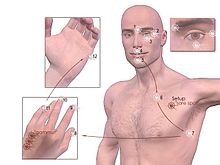This is an old revision of this page, as edited by DubstepDalton (talk | contribs) at 14:53, 25 February 2018 (Removing more bias and lack of references). The present address (URL) is a permanent link to this revision, which may differ significantly from the current revision.
Revision as of 14:53, 25 February 2018 by DubstepDalton (talk | contribs) (Removing more bias and lack of references)(diff) ← Previous revision | Latest revision (diff) | Newer revision → (diff) An accepted version of this page, accepted on 25 February 2018, was based on this revision.Not to be confused with Emotionally focused therapy.
| Alternative medicine | |
|---|---|
 | |
| Claims | Tapping on "meridian points" on the body, derived from acupuncture, can release "energy blockages" that cause "negative emotions" |
| Related fields | Acupuncture, Acupressure, Energy medicine |
| Year proposed | 1993 |
| Original proponents | Gary Craig |
| Subsequent proponents | Jack Canfield, Nick Ortner |
| See also | Thought Field Therapy, Tapas Acupressure Technique |
Emotional Freedom Techniques (EFT) is a form of counseling intervention that draws on various theories of alternative medicine including acupuncture, neuro-linguistic programming, energy medicine, and Thought Field Therapy (TFT). It is best known through Gary Craig's EFT Handbook, published in the late 1990s, and related books and workshops by a variety of teachers. EFT and similar techniques are often discussed under the umbrella term "energy psychology".
Advocates claim that the technique may be used to treat a wide variety of physical and psychological disorders, and as a simple form of self-administered therapy. The Skeptical Inquirer describes the foundations of EFT as "a hodgepodge of concepts derived from a variety of sources, the ancient Chinese philosophy of chi, which is thought to be the 'life force' that flows throughout the body." The existence of this life force is "not empirically supported".
Process

During a typical EFT session, the person will focus on a specific issue while tapping on "end points of the body's energy meridians".
According to the EFT manual, the procedure consists of the participant rating the emotional intensity of their reaction on a Subjective Units of Distress Scale (SUDS) (a Likert scale for subjective measures of distress, calibrated 0-10) then repeating an orienting affirmation while rubbing or tapping specific points on the body. Some practitioners incorporate eye movements or other tasks. The emotional intensity is then rescored and repeated until no changes are noted in the emotional intensity.
Mechanism
Proponents of EFT and other similar treatments believe that tapping/stimulating acupuncture points provide the basis for significant improvement in psychological problems. However, the theory and mechanisms underlying the supposed effectiveness of EFT have "no evidentiary support" "in the entire history of the sciences of biology, anatomy, physiology, neurology, physics, or psychology." Researchers have described the theoretical model for EFT as "frankly bizarre" and "pseudoscientific." One review noted that one of the highest quality studies found no evidence that the location of tapping points made any difference, and attributed effects to well-known psychological mechanisms, including distraction and breathing therapy.
Research quality
A 2009 review found "methodological flaws" in research studies that had reported "small successes" for EFT and the related Tapas Acupressure Technique. The review concluded that positive results may be "attributable to well-known cognitive and behavioral techniques that are included with the energy manipulation. Psychologists and researchers should be wary of using such techniques, and make efforts to inform the public about the ill effects of therapies that advertise miraculous claims."
A 2016 systematic review found that EFT was effective in reducing anxiety compared to controls, but also called for more research comparing its effectiveness to that of established treatments.
Reception
A Delphi poll of an expert panel of psychologists rated EFT on a scale describing how discredited EFT has been in the field of psychology. On average, this panel found EFT had a score of 3.8 on a scale from 1.0 to 5.0, with 3.0 meaning "possibly discredited" and a 4.0 meaning "probably discredited." A book examining pseudoscientific practices in psychology characterized EFT as one of a number of "fringe psychotherapeutic practices", and a psychiatry handbook states EFT has "all the hallmarks of pseudoscience".
References
- ^ Craig, G (n.d.). EFT Manual (pdf). Retrieved 2011-05-03.
- Cite error: The named reference
csicopwas invoked but never defined (see the help page). - Cite error: The named reference
Feinsteinwas invoked but never defined (see the help page). - ^ Cite error: The named reference
Bakkerwas invoked but never defined (see the help page). - Waite, Wendy L; Holder, Mark D (2003). "Assessment of the Emotional Freedom Technique". Scientific Review of Mental Health Practice. 2 (1).
- McCaslin DL (June 2009). "A review of efficacy claims in energy psychology". Psychotherapy (Chicago). 46 (2): 249–56. doi:10.1037/a0016025. PMID 22122622.
- Clond, Morgan (May 2016). "Emotional Freedom Techniques for Anxiety: A Systematic Review With Meta-analysis". The Journal of Nervous and Mental Disease. 204 (5): 388–395. doi:10.1097/NMD.0000000000000483. ISSN 1539-736X. PMID 26894319.
- Norcross, John C.; Koocher, Gerald P.; Garofalo, Ariele (1 January 2006). "Discredited psychological treatments and tests: A Delphi poll". Professional Psychology: Research and Practice. 37 (5): 515–522. doi:10.1037/0735-7028.37.5.515.
- Lilienfeld, Scott O. (2003). Science and pseudoscience in clinical psychology (Paperback ed.). New York : Guilford Press. p. 2. ISBN 1-57230-828-1.
- Semple, David (2013). Oxford Handbook of Psychiatry. Oxford, UK: Oxford University Press. p. 393. ISBN 978-0-19-969388-7.
External links
 Media related to Emotional Freedom Techniques at Wikimedia Commons
Media related to Emotional Freedom Techniques at Wikimedia Commons